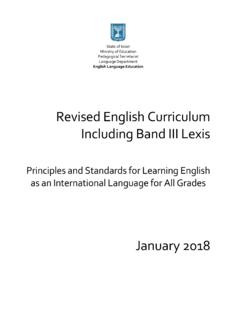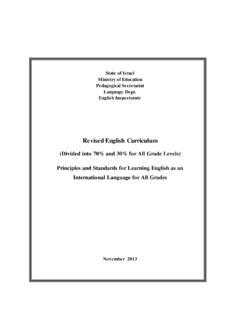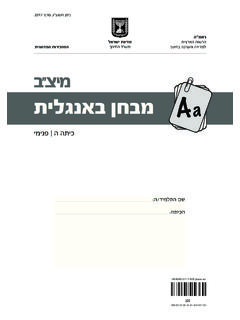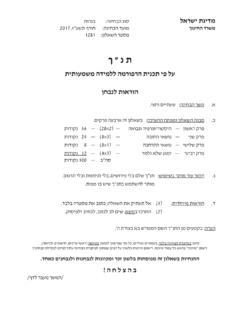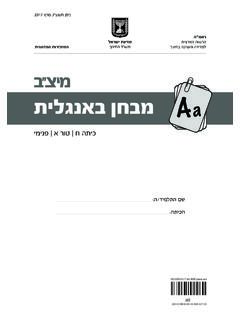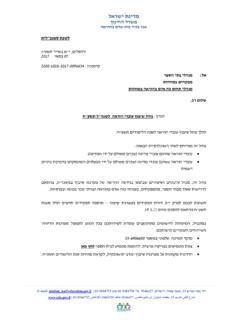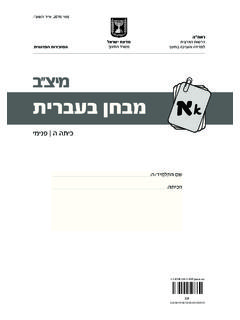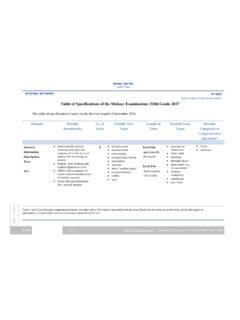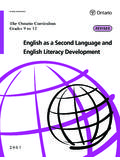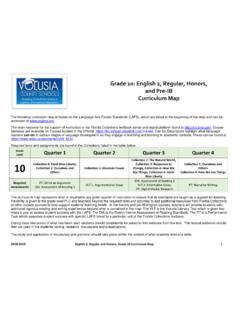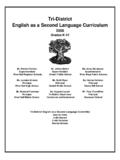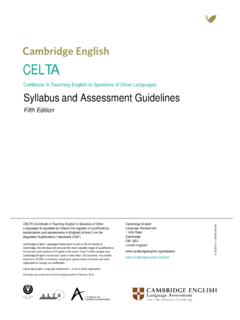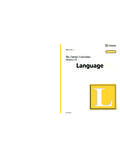Transcription of State of Israel Ministry of Education Pedagogical ...
1 State of Israel Ministry of Education Pedagogical Secretariat Language Dept. english Inspectorate Revised english curriculum Principles and Standards for Learning english as an International Language for All Grades November 2013. Acknowledgements Thanks to the english curriculum Committee for preparing the draft version which later served as a blueprint for this document: Dr. Judy Steiner, Chief Inspector for english Language Education , Oranim, Academic College of Education Prof. Lily Orland, Chairperson, Dean, Faculty of Education , Haifa University. Dr. Sarah Schrire, Chairperson, curriculum Committee. Head of ICT Unit, Kibbutzim College of Education Dr. Lisa Amdur, Coordinator, curriculum Committee, Ministry of Education Mdalale Azzam - Abu Saleem Salman Al-Sheikh Junior High School, Abu Snan Dr. Elisheva Barkon, Head of english Department Oranim, Academic College of Education Amanda Caplan, De Shalit School; Teacher trainer, Ministry of Education Ora Gvirsman, english Coordinator, Hadar School, Raanana Nira Hecht ".
2 Dr. Michele Horowitz, Head of english Language Education , Levinsky College Fahed Jeries, Makif ORT Tarchiha Debbie Lahav, NCJWR Institution for Innovation in Education , Hebrew University Dr. Debbie Lifschitz, Michlalah Jerusalem College Chava Shatsky, Thanks to the following people for their academic and field-based consultation: Sigalit Arditi - National Counselor, ICT. Elaine Coleman, Oranim Academic College of Education Prof. Elinor Saiegh-Haddad, english Department (Linguistics Division), Bar-Ilan University Dr. Janina Kahn-Horwitz, Oranim Academic College of Education ; Edmond J. Safra Brain Research Center for the Study of Learning Disabilities, University of Haifa Prof. Batia Laufer, Department of english Language and Literature, University of Haifa Dr. Tina Waldman, Vocabulary Consultant, Kibbutzim College of Education Dr.
3 Zofia Yoed, Head of curriculum Dept., Ministry of Education Thanks to the following people for their contribution to the revision and final version of the current document: Idit Bar curriculum Development, Language Dept., Ministry of Education Dr. Miriam Kluska, Ministry of Education ; Achva College Tzilla Miron-Eylon, Acting Head of Language Dept., Ministry of Education Dr. Shoshana Plavin, Ministry of Education ; Talpiot Academic College Prof. Penny Ur, Oranim Academic College of Education . Table of Contents Introduction .. 5. Rationale for Updating the curriculum .. 6. Overview of Document .. 7. Section One: 7. A. Principles underlying meaningful language learning and language teaching .. 8. B. Principles underlying teaching the beginning stages of language acquisition (Pre- Foundation Level Stages One and Two).
4 11. C. Principles underlying the choice of materials .. 12. D. Principles underlying the choice and design of tasks .. 12. E. Principles underlying classroom assessment .. 13. F. Principles underlying the integration of Information Communications Technology (ICT) . 14. Section Two: Overview of the curriculum .. 15. Brief Overview .. 15. A. Standards ..16. B. Domains .. 16. C. 17. D. Benchmarks ..17. Section Three: Higher-Order Thinking Skills (HOTS) ..18. Section Four: Components of Language Teaching .. 19. A. Lexis .. 19. B. Grammar .. 20. Section Five: Benchmarks for the Pre-Foundation Level Stages One and Two .. 21. Section Six: Standards, Levels of Progression and Benchmarks for All Levels .. 22. Domain of Social Interaction .. 23. Domain of Access to Information .. 25. Domain of Presentation .. 27. Domain of Appreciation of Language, Literature and Culture.
5 29. Section Seven: Domains, Benchmarks, Text Characteristics, Higher-Order Thinking Skills Lexis, and Grammar for Each 32. Foundation Level .. 33. Intermediate Level .. 46. Proficiency Level .. 60. Section Eight: Key Components in the Teaching of Literature .. 67. Section Nine: Learner Diversity .. 69. Section Ten: Recommendations for Implementing the curriculum .. 70. Background Reading .. 71. Introduction Perhaps the most dramatic development that has taken place in the field of english language teaching in the last generation has been the shift in its primary function: from being the native language of nations, such as the UK or USA, to being mainly a global means of communication. The speakers of english whose mother tongue is another language already vastly outnumber the english native speakers, and their relative number continues to grow.
6 For most of its learners, english is therefore no longer a foreign language ( one that is owned by a particular other'. nation or ethnic group) but first and foremost an international language (one that has no particular national owner). One of the crucial implications of this development is the increased importance for all of a knowledge of english . Speakers of Hebrew or Arabic will need to be able to use both spoken and written english in order to progress in their professional, business or academic careers, as well as in order to travel, enjoy international entertainment, or take advantage of the opportunities offered by the Internet. The effective teaching of english thus takes high priority, necessitating a larger number of teaching hours, well-trained teachers, a carefully planned curriculum , attractive and learning-rich materials, and the setting of high standards for assessment.
7 The english curriculum in Israel sets out the expected standards for the teaching of english in Israel , in schools under the supervision of the Ministry of Education . This includes all sectors: secular, religious, Arab, Druze, and Bedouin. The document is an important contributor to classroom teaching; it will also be used to inform teacher trainers and materials and test writers, as shown in the table below. Target Audiences Possible Uses Teachers unit planning integrating classroom testing and teaching developing tables of specification for classroom testing adapting materials mapping out additional tasks Teacher Trainers training teachers in the implementation of the mapping process and the use of the checklists Material and Test Writers developing materials and tests 5. Rationale for Updating the curriculum Research in foreign language acquisition and insights from the field during the last decade have set new challenges for EFL teaching, learning and assessment, requiring an in-depth re- examination of the english curriculum Principles and Standards for Learning english as a Foreign Language published in 2001.
8 As a result of this process, it was decided to revise and expand the document, resulting in a curriculum that will better address the needs of teachers, material writers and test designers. The following new components have been integrated into the curriculum : Benchmarks for teaching english at the Pre-Foundation Level, in order to facilitate the teaching of the beginning stages of language acquisition to younger learners. Word and grammar lists, in order to standardize the linguistic content of materials being taught and tested. Higher-order thinking skills (HOTS) at all levels and all domains, in order to enhance learners' understanding and critical thinking. Information Communications Technology (ICT) skills, in order to enable learners to be prepared to cope with the challenges of using modern digital tools.
9 Key components for the teaching of literature (and access to information when appropriate) at all levels, in order to provide a more unified and comprehensive framework for literature teaching. Goals of the curriculum This curriculum is an expansion of the curriculum published in 2001. It adheres to the goals set in 2001, whereby on completion of the twelfth grade, learners should be able to: interact effectively in a variety of situations;. access and make use of information from a variety of sources and media;. present information in an organized manner;. appreciate literature and other cultures, and develop linguistic awareness. 6. Overview of Document Section One of this document presents the principles underlying language learning and teaching. Section Two describes the organization of the curriculum and includes an overview of the domains and the levels.
10 Section Three focuses on two linguistic components of language teaching: lexis and grammar. Section Four presents the benchmarks for the Pre-Foundation Level. Section Five provides a general overview for all levels. It includes standards, levels of progression, and benchmarks. Section Six focuses on each individual level: Foundation, Intermediate and Proficiency: for each level the benchmarks are again presented, together with higher-order thinking skills, required lexical items, and grammar. Section Seven deals with learner diversity. Section Eight provides recommendations for implementing the curriculum . Finally, there is list of references and background reading. Section One: Principles The principles presented in this section have been drawn from insights based on expert teachers'. professional judgment, enriched by current research in the fields of foreign language learning, Education , assessment, cognitive psychology, and curriculum development.
